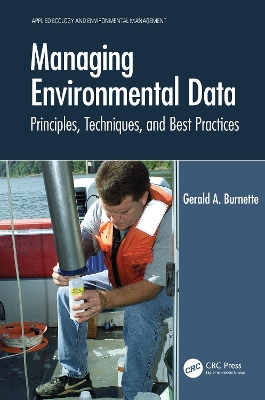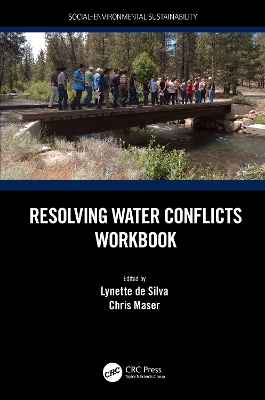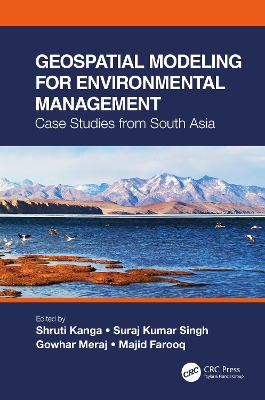Bioremediation and Biotechnology, Vol 3
 portes grátis
portes grátis
Bioremediation and Biotechnology, Vol 3
Persistent and Recalcitrant Toxic Substances
Hakeem, Khalid Rehman; Saud Al-Saud, Najla Bint; Bhat, Rouf Ahmad
Springer Nature Switzerland AG
07/2021
360
Mole
Inglês
9783030460778
15 a 20 dias
581
Ricardo Antunes Azevedo; Department de Genetica Escola Superior de Agricutura Luiz de Queiroz, Universidade de sao Paulo, SEP 13418-900, Piracicaba, SP, Brazil; raazeved@esalq.usp.br
2. Concerns and threats of Xenobiotics on aquatic ecosystems
Tihana Tekli; Department of Agroecology, Faculty of Agriculture, University J. J. Strossmayer in Osijek, Kralja Osijek, Croatia; tteklic@pfos.hr
3. Ecotoxicity of Pesticide and heavy metals on aquatic environs
Sartaj Hussain Bhat; Gifu University, 1-1 Yanagido, Gifu City-501-1193, Japan, email: sartajbhat88@gmail.com
4. Approaches and methods for evaluation of persistent pollutant load in different aquatic environs
Moshe Sagi; The Jacob Blaustein Institutes for Desert Research, The Albert Katz Department of Dryland Biotechnologies, Ben-Gurion University, PO Box 653, Beer Sheva 84105, Israel; gizi@bgu.ac.il
5. Role of innovative techniques for assessing and monitoring of persistent pollutants in different environs
Rocio Leyva; Departamento de Fisiologia Vegetal, Facultad de Ciencias, Universidad de Granada, 18071 Granada, Spain; roleyva@correo.ugr.es
6. Global scenario of remediation techniques to combat recalcitrant pollutants
Monica Butnariu
Banat's University of Agricultural Sciences and Veterinary Medicine "King Michael I of Romania" from Timisoara, 300645, Calea Aradului 119, Timis, Romania (email: monicabutnariu@yahoo.com)
7. Microbial biota for degradation of persistent pollutants
Fernanda Maria Policarpo Tonelli
Department of Cellular Biology, Institute of Biological Science, Federal University of Minas Gerais, Belo Horizonte, Brazil
email: tonellibioquimica@gmail.com
8. Mycoremediation: a sustainable approach for pesticide pollution abatement
Monica Butnariu
Monica Banat's University of Agricultural Sciences and Veterinary Medicine "King Michael I of Romania" from Timisoara, 300645, Calea Aradului 119, Timis, Romania (email: monicabutnariu@yahoo.com)
9. Credibility of Nano-technology for Sustainable Agricultural Industries
Sha Liu; Department of Plant Soil and Microbial Sciences, Michigan State University, East Lansing, MI 48824, United States; Merewitz@msu.edu
10. Application and advantages of alternative approaches in lieu of synthetic persistent substances
Muneeb U Rehman
Department of Clinical Pharmacy, College of Pharmacy, King Saud
Email: muneebjh@gmail.com
11. Ecofriendly Approaches for Remediation of Pesticides in Contaminated Environs
Jian-Kang Zhu; Shanghai Center for Plant Stress Biology and Centre for Excellence in Molecular Plant Sciences, Chinese Academy of Sciences, Shanghai 201602, China ; jkzhu@purdue.edu
12. Application of macrophytes environmentally sound technique for cleaning of polluted environs
Olga Natalia Bustos Lopez
Universidad Autonoma de Tamaulipas, Mexico mail: olga.bustos@uat.edu.mx
13. Role of Biotechnology in Pesticide Remediation
Farhana Maqbool
Department of Biochemistry, Hazara University, Mansehra, 21300, KPK, Pakistan, email: drfarhana@hu.edu.pk
14. Microbial Remediation: A Sustainable Approach for Degradation of persistent and recalcitrant pollutants (Polyaromatic hydrocarbons).
Adeel Malik; Chungnam National University, Daejeon, South Korea; adeelmalik010@gmail.com
15. Microbial aspects of Pesticide Remediation
N. Malash; Faculty of Agriculture, Menofiya University, Shibin El-Kom, Egypt; n_malash@hotmail.com
16. Phytoremediation technology: a sustainable solution for cleaning up of recalcitrant pollutants from disturbed environs
Adeel Malik; Chungnam National University, Daejeon, South Korea; adeelmalik010@gmail.com
17. Application of biotechnology for restoration of degraded environs
Omar bin Hameed; Department of Food Science and Process Engineering Abaya Campus Arba Minch University, Ethiopia; omargojwari@gmail.com
18. Role of biotechnology for degradation of synthetic dyes from wastewater
Amnah Yusaf
Department of Chemistry, Government College University, Faisalabad 38000, Pakistan
Corresponding Author: usm_ca@yahoo.com
19. Pesticide and heavy metal pollution remediation by way of using genetically modified plants (GMP).
Mingyong Zhang; Key Laboratory of South China Agricultural Plant Genetics and Breeding, Key Laboratory of Plant Resources Conservation and Sustainable Utilization, South China Botanical Garden, Chinese Academy of Sciences, Guangzhou, China; zhangmy@scib.ac.cn
Ricardo Antunes Azevedo; Department de Genetica Escola Superior de Agricutura Luiz de Queiroz, Universidade de sao Paulo, SEP 13418-900, Piracicaba, SP, Brazil; raazeved@esalq.usp.br
2. Concerns and threats of Xenobiotics on aquatic ecosystems
Tihana Tekli; Department of Agroecology, Faculty of Agriculture, University J. J. Strossmayer in Osijek, Kralja Osijek, Croatia; tteklic@pfos.hr
3. Ecotoxicity of Pesticide and heavy metals on aquatic environs
Sartaj Hussain Bhat; Gifu University, 1-1 Yanagido, Gifu City-501-1193, Japan, email: sartajbhat88@gmail.com
4. Approaches and methods for evaluation of persistent pollutant load in different aquatic environs
Moshe Sagi; The Jacob Blaustein Institutes for Desert Research, The Albert Katz Department of Dryland Biotechnologies, Ben-Gurion University, PO Box 653, Beer Sheva 84105, Israel; gizi@bgu.ac.il
5. Role of innovative techniques for assessing and monitoring of persistent pollutants in different environs
Rocio Leyva; Departamento de Fisiologia Vegetal, Facultad de Ciencias, Universidad de Granada, 18071 Granada, Spain; roleyva@correo.ugr.es
6. Global scenario of remediation techniques to combat recalcitrant pollutants
Monica Butnariu
Banat's University of Agricultural Sciences and Veterinary Medicine "King Michael I of Romania" from Timisoara, 300645, Calea Aradului 119, Timis, Romania (email: monicabutnariu@yahoo.com)
7. Microbial biota for degradation of persistent pollutants
Fernanda Maria Policarpo Tonelli
Department of Cellular Biology, Institute of Biological Science, Federal University of Minas Gerais, Belo Horizonte, Brazil
email: tonellibioquimica@gmail.com
8. Mycoremediation: a sustainable approach for pesticide pollution abatement
Monica Butnariu
Monica Banat's University of Agricultural Sciences and Veterinary Medicine "King Michael I of Romania" from Timisoara, 300645, Calea Aradului 119, Timis, Romania (email: monicabutnariu@yahoo.com)
9. Credibility of Nano-technology for Sustainable Agricultural Industries
Sha Liu; Department of Plant Soil and Microbial Sciences, Michigan State University, East Lansing, MI 48824, United States; Merewitz@msu.edu
10. Application and advantages of alternative approaches in lieu of synthetic persistent substances
Muneeb U Rehman
Department of Clinical Pharmacy, College of Pharmacy, King Saud
Email: muneebjh@gmail.com
11. Ecofriendly Approaches for Remediation of Pesticides in Contaminated Environs
Jian-Kang Zhu; Shanghai Center for Plant Stress Biology and Centre for Excellence in Molecular Plant Sciences, Chinese Academy of Sciences, Shanghai 201602, China ; jkzhu@purdue.edu
12. Application of macrophytes environmentally sound technique for cleaning of polluted environs
Olga Natalia Bustos Lopez
Universidad Autonoma de Tamaulipas, Mexico mail: olga.bustos@uat.edu.mx
13. Role of Biotechnology in Pesticide Remediation
Farhana Maqbool
Department of Biochemistry, Hazara University, Mansehra, 21300, KPK, Pakistan, email: drfarhana@hu.edu.pk
14. Microbial Remediation: A Sustainable Approach for Degradation of persistent and recalcitrant pollutants (Polyaromatic hydrocarbons).
Adeel Malik; Chungnam National University, Daejeon, South Korea; adeelmalik010@gmail.com
15. Microbial aspects of Pesticide Remediation
N. Malash; Faculty of Agriculture, Menofiya University, Shibin El-Kom, Egypt; n_malash@hotmail.com
16. Phytoremediation technology: a sustainable solution for cleaning up of recalcitrant pollutants from disturbed environs
Adeel Malik; Chungnam National University, Daejeon, South Korea; adeelmalik010@gmail.com
17. Application of biotechnology for restoration of degraded environs
Omar bin Hameed; Department of Food Science and Process Engineering Abaya Campus Arba Minch University, Ethiopia; omargojwari@gmail.com
18. Role of biotechnology for degradation of synthetic dyes from wastewater
Amnah Yusaf
Department of Chemistry, Government College University, Faisalabad 38000, Pakistan
Corresponding Author: usm_ca@yahoo.com
19. Pesticide and heavy metal pollution remediation by way of using genetically modified plants (GMP).
Mingyong Zhang; Key Laboratory of South China Agricultural Plant Genetics and Breeding, Key Laboratory of Plant Resources Conservation and Sustainable Utilization, South China Botanical Garden, Chinese Academy of Sciences, Guangzhou, China; zhangmy@scib.ac.cn
















